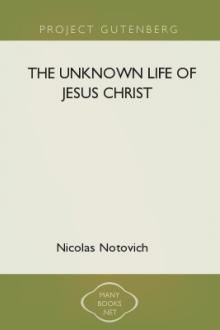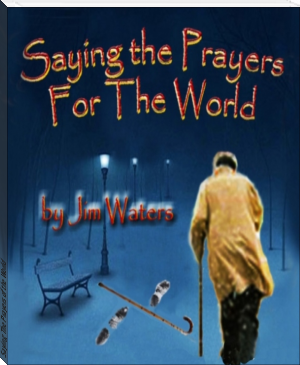The Unknown Life of Jesus Christ - Nicolas Notovitch (best novels in english txt) 📗

- Author: Nicolas Notovitch
- Performer: -
Book online «The Unknown Life of Jesus Christ - Nicolas Notovitch (best novels in english txt) 📗». Author Nicolas Notovitch
I had quite given up all hope of approaching this much-wished-for fire, when it appeared again, and this time so near that our horses stopped before it.
I have here to express my sincere thanks to the Englishmen for the foresight of which they gave proof in building by the roadsides the little bengalows—one-story houses for the shelter of travellers. It is true, one must not demand comfort in this kind of hotel; but this is a matter in which the traveller, broken down by fatigue, is not exacting, and he is at the summit of happiness when he finds at his disposal a clean and dry room.
The Hindus, no doubt, did not expect to see a traveller arrive at so late an hour of the night and in this season, for they had taken away the keys of the bengalow, so we had to force an entrance. I threw myself upon a bed prepared for me, composed of a pillow and blanket saturated with water, and almost at once fell asleep. At daybreak, after taking tea and some conserves, we took up our march again, now bathed in the burning rays of the sun. From time to time, we passed villages; the first in a superb narrow pass, then along the road meandering in the bosom of the mountain. We descended eventually to the river Djeloum (Jhelum), the waters of which flow gracefully, amid the rocks by which its course is obstructed, between rocky walls whose tops in many places seem almost to reach the azure skies of the Himalayas, a heaven which here shows itself remarkably pure and serene.
Toward noon we arrived at the hamlet called Tongue—situated on the bank of the river—which presents an unique array of huts that give the effect of boxes, the openings of which form a façade. Here are sold comestibles and all kinds of merchandise. The place swarms with Hindus, who bear on their foreheads the variously colored marks of their respective castes. Here, too, you see the beautiful people of Kachmyr, dressed in their long white shirts and snowy turbans. I hired here, at a good price, a Hindu cabriolet, from a Kachmyrian. This vehicle is so constructed that in order to keep one's seat in it, one must cross his legs in the Turkish fashion. The seat is so small that it will hold, at most, only two persons. The absence of any support for the back makes this mode of transportation very dangerous; nevertheless, I accepted this kind of circular table mounted on two wheels and drawn by a horse, as I was anxious to reach, as soon as possible, the end of my journey. Hardly, however, had I gone five hundred yards on it, when I seriously regretted the horse I had forsaken, so much fatigue had I to endure keeping my legs crossed and maintaining my equilibrium. Unfortunately, it was already too late.
Evening was falling when I approached the village of Hori. Exhausted by fatigue; racked by the incessant jolting; my legs feeling as if invaded by millions of ants, I had been completely incapable of enjoying the picturesque landscape spread before us as we journeyed along the Djeloum, the banks of which are bordered on one side by steep rocks and on the other by the heavily wooded slopes of the mountains. In Hori I encountered a caravan of pilgrims returning from Mecca.
Thinking I was a physician and learning my haste to reach Ladak, they invited me to join them, which I promised I would at Srinagar.
I spent an ill night, sitting up in my bed, with a lighted torch in my hand, without closing my eyes, in constant fear of the stings and bites of the scorpions and centipedes which swarm in the bengalows. I was sometimes ashamed of the fear with which those vermin inspired me; nevertheless, I could not fall asleep among them. Where, truly, in man, is the line that separates courage from cowardice? I will not boast of my bravery, but I am not a coward, yet the insurmountable fear with which those malevolent little creatures thrilled me, drove sleep from my eyelids, in spite of my extreme fatigue.
Our horses carried us into a flat valley, encircled by high mountains. Bathed as I was in the rays of the sun, it did not take me long to fall asleep in the saddle. A sudden sense of freshness penetrated and awoke me. I saw that we had already begun climbing a mountain path, in the midst of a dense forest, rifts in which occasionally opened to our admiring gaze ravishing vistas, impetuous torrents; distant mountains; cloudless heavens; a landscape, far below, of wondrous beauty. All about us were the songs of numberless brilliantly plumaged birds. We came out of the forest toward noon, descended to a little hamlet on the bank of the river, and after refreshing ourselves with a light, cold collation, continued our journey. Before starting, I went to a bazaar and tried to buy there a glass of warm milk from a Hindu, who was sitting crouched before a large cauldron full of boiling milk. How great was my surprise when he proposed to me that I should take away the whole cauldron, with its contents, assuring me that I had polluted the milk it contained! "I only want a glass of milk and not a kettle of it," I said to him.
"According to our laws," the merchant answered me, "if any one not belonging to our caste has fixed his eyes for a long time upon one of our cooking utensils, we have to wash that article thoroughly, and throw away the food it contains. You have polluted my milk and no one will drink any more of it, for not only were you not contented with fixing your eyes upon it, but you have even pointed to it with your finger."
I had indeed a long time examined his merchandise, to make sure that it was really milk, and had pointed with my finger, to the merchant, from which side I wished the milk poured out. Full of respect for the laws and customs of foreign peoples, I paid, without dispute, a rupee, the price of all the milk, which was poured in the street, though I had taken only one glass of it. This was a lesson which taught me, from now on, not to fix my eyes upon the food of the Hindus.
There is no religious belief more muddled by the numbers of ceremonious laws and commentaries prescribing its observances than the Brahminic.
While each of the other principal religions has but one inspired book, one Bible, one Gospel, or one Koran—books from which the Hebrew, the Christian and the Musselman draw their creeds—the Brahminical Hindus possess such a great number of tomes and commentaries in folio that the wisest Brahmin has hardly had the time to peruse one-tenth of them. Leaving aside the four books of the Vedas; the Puranas—which are written in Sanscrit and composed of eighteen volumes—containing 400,000 strophes treating of law, rights, theogony, medicine, the creation and destruction of the world, etc.; the vast Shastras, which deal with mathematics, grammar, etc.; the Upa-Vedas, Upanishads, Upo-Puranas—which are explanatory of the Puranas;—and a number of other commentaries in several volumes; there still remain twelve vast books, containing the laws of Manu, the grandchild of Brahma—books dealing not only with civil and criminal law, but also the canonical rules—rules which impose upon the faithful such a considerable number of ceremonies that one is surprised into admiration of the illimitable patience the Hindus show in observance of the precepts inculcated by Saint Manu. Manu was incontestably a great legislator and a great thinker, but he has written so much that it has happened to him frequently to contradict himself in the course of a single page. The Brahmins do not take the trouble to notice that, and the poor Hindus, whose labor supports the Brahminic caste, obey servilely their clergy, whose prescriptions enjoin upon them never to touch a man who does not belong to their caste, and also absolutely prohibit a stranger from fixing his attention upon anything belonging to a Hindu. Keeping himself to the strict letter of this law, the Hindu imagines that his food is polluted when it receives a little protracted notice from the stranger.
And yet, Brahminism has been, even at the beginning of its second birth, a purely monotheistic religion, recognizing only one infinite and indivisible God. As it came to pass in all times and in religions, the clergy took advantage of the privileged situation which places them above the ignorant multitude, and early manufactured various exterior forms of cult and certain laws, thinking they could better, in this way, influence and control the masses. Things changed soon, so far that the principle of monotheism, of which the Vedas have given such a clear conception, became confounded with, or, as it were, supplanted by an absurd and limitless series of gods and goddesses, half-gods, genii and devils, which were represented by idols, of infinite variety but all equally horrible looking. The people, once glorious as their religion was once great and pure, now slip by degrees into complete idiocy. Hardly does their day suffice for the accomplishment of all the prescriptions of their canons. It must be said positively that the Hindus only exist to support their principal caste, the Brahmins, who have taken into their hands the temporal power which once was possessed by independent sovereigns of the people. While governing India, the Englishman does not interfere with this phase of the public life, and so the Brahmins profit by maintaining the people's hope of a better future.
The sun passed behind the summit of a mountain, and the darkness of night in one moment overspread the magnificent landscape we were traversing. Soon the narrow valley of the Djeloum fell asleep. Our road winding along ledges of steep rocks, was instantly hidden from our sight; mountains and trees were confounded together in one dark mass, and the stars glittered in the celestial vault. We had to dismount and feel our way along the mountain side, for fear of becoming the prey of the abyss which yawned at our feet. At a late hour of the night we traversed a bridge and ascended a steep elevation leading to the bengalow Ouri, which at this height seems to enjoy complete isolation. The next day we traversed a charming region, always going along the river—at a turn of which we saw the ruins of a Sikh fortress, that seemed to remember sadly its glorious past. In a little valley, nestled amid the mountains, we found a bengalow which seemed to welcome us. In its proximity were encamped a cavalry regiment of the Maharajah of Kachmyr.
When the officers learned that I was a Russian, they invited me to share their repast. There I had the pleasure of making the acquaintance of Col. Brown, who was the first to compile a dictionary of the Afghan-pouchton language.
As I was anxious to reach, as soon as possible, the city of Srinagar, I, with little delay, continued my journey through the picturesque region lying at the foot of the mountains, after having, for a long time, followed the course of the river. Here, before our eyes, weary of the monotonous





Comments (0)